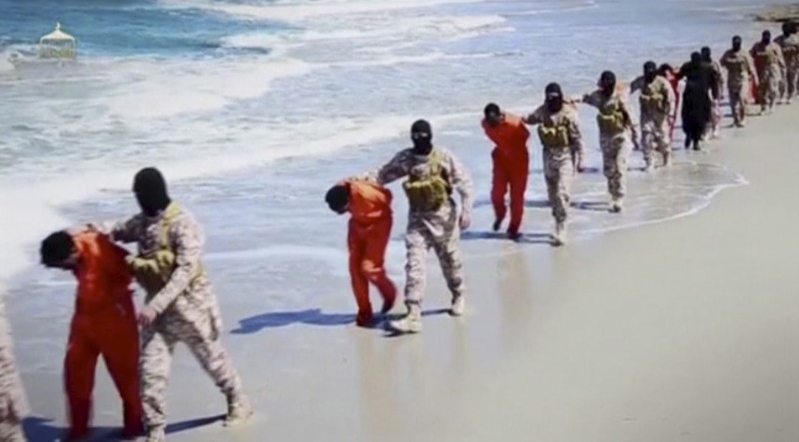
Pope Francis has said the atrocities perpetrated against Christians in Iraq and Syria are far more than just "genocide," and should be correctly described as "persecution" and "martyrdom."
"I want to say clearly, I do not like it when one speaks of a genocide of Christians, for instance in the Middle East," the Pope said during a question-and-answer session on Saturday at the Villa Nazareth University College in Rome. "This is reductionism! The truth is a persecution which leads Christians to have fidelity to the consistency of their faith."
This "sociological reductionism" does not apply to "that which is a mystery of the faith, the martyr!"
Pope reflected on the faith of the 21 Coptic Christian martyrs who were beheaded by ISIS fighters on the beach in Libya last February. At the time of their death, all of the martyrs cried out, "Jesus, help me!"
"[These men] were witnesses of the faith," the pontiff said.
Francis emphasized that martyrdom doesn't always mean losing one's life for their life; it can also be demonstrated everyday through honesty, the patient education of children, faithfulness to love, etc.
He also praised the "martyrdom" of resisting the temptation to gossip, which he compared to a "terrorist bomb."
"The Christian witness is the martyrdom of every day, the martyrdom to remain silent."
Ultimately there is joy found in the Gospel, "like those on the beach of Libya . . . it takes courage! And courage is a gift of the Holy Spirit."
"Courage and patience" are the words the apostle Paul uses to describe the life of the Christian martyr, the Pope said: "the courage to go forward," unashamed of being Christian, and with "the patience to carry the weight of every day," including our own sufferings, sins, and instabilities.
In March, U.S. Secretary of State John Kerry declared that ISIS is committing genocide against Christians and other ancient minority groups in the Middle East amid mounting pressure from faith groups.
"My purpose in appearing before you today is to assert that in my judgement, Daesh [Arabic acronym for IS] is responsible for genocide against groups in areas under its control, including Yazidis, Christians and Shia Muslims," Kerry said at the time. "Daesh is genocidal by self-proclamation, by ideology and by actions - in what it says, what it believes and what it does."
During a special session on the genocide of Christians held in February at NRB, the International Christian Media Convention, Canon Andrew White, Vicar Emeritus of St. George's Church in Baghdad, shared sobering firsthand accounts of the horror perpetrated by the terror group and urged Christians to not just pray for those persecuted worldwide, but actually put such words into action.
"We Christians! We talk about looking after the Persecuted Church. You talk about helping those who are suffering for their faith. But do you mean it? Or is it just talk and prayer?" he asked.
White clarified that while "prayer is a very good thing," it's even more important to "pray for peace and pay for peace."
"It's no good praying and doing nothing. If you really care, you will provide for those in need," he said, referencing James 2:14-17, which states, "What good is it, my brothers, if someone says he has faith but does not have works? Can that faith save him? If a brother or sister is poorly clothed and lacking in daily food, and one of you says to them, 'Go in peace, be warmed and filled,' without giving them the things needed for the body, what good is that? So also faith by itself, if it does not have works, is dead."
White concluded: "These are your people. Will you come back with me, metaphorically, and help your brothers and sisters?"






